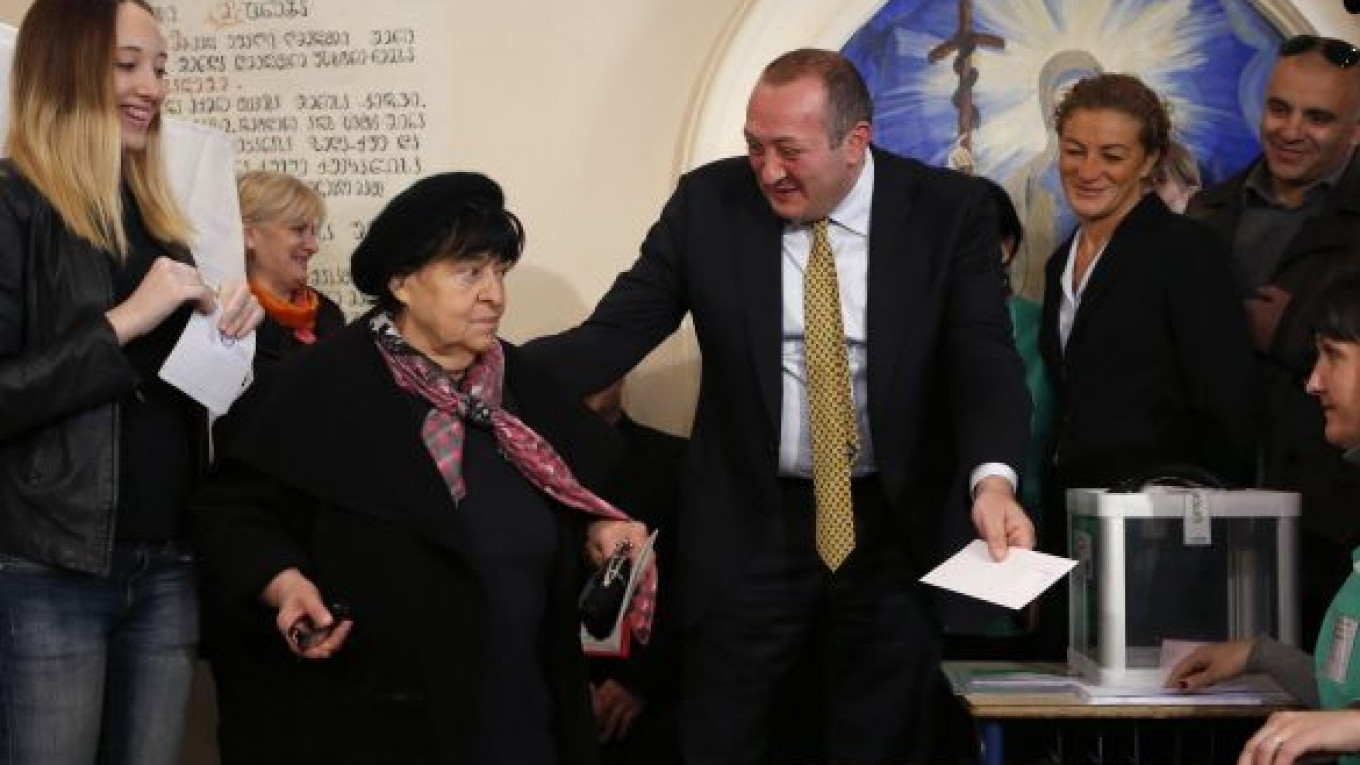TBILISI — Georgia voted for a new president Sunday in an election that will bring the curtain down on Mikheil Saakashvili's decade-long rule, but is unlikely to end political uncertainty in the former Soviet republic.
The front-runner to replace Saakashvili, a pro-Western leader who has served the maximum two terms, is Georgy Margvelashvili, a member of the Georgian Dream coalition that ousted the president's cabinet in an election a year ago.
An exit poll released after voting concluded at 8 p.m. showed Margvelashvili leading with 66.7 percent of votes, Interfax reported. Official results were not expected to be released until Monday.
Saakashvili's departure should end feuding that has hindered policy-making and the investment climate, and cement Georgian Dream's hold on power, but the future is clouded by Prime Minister Bidzina Ivanishvili's decision to step aside as well.
The imminent retreat of Ivanishvili, the nation's richest man and Georgian Dream's leader, increases uncertainty in a country that is strategically important for Russia and Europe, which gets Caspian oil and gas through pipelines via Georgia.
"I will vote for Margvelashvili of course. He is a new type of politician, a new generation," said Gogi Popkhadze, 35 and unemployed, as he voted in bright sunshine in central Tbilisi.
Tsira Gabrichidze, a 68-year-old pensioner, said she remained loyal to Saakashvili and voted for David Bakradze, a former parliamentary speaker from the president's party.
"We need a balance, and I think it will be good to have a president from a party that is different from the ruling coalition," she said in Tbilisi, where dilapidated homes stand beside modern offices, underlining Georgia's economic problems.
Ivanishvili, 57, entered politics in the South Caucasus country only two years ago, after making a fortune in business, but says his job will be complete when Saakashvili departs.
After the election, constitutional changes take effect that will shift power from the presidency to the government and parliament. No major policy changes are expected, but Ivanishvili has not said who will be prime minister.
"This is not only a presidential election, but it is also a major change in the political system in Georgia," said Helen Khoshtaria, an independent political analyst.
The arrest of several former ministers, including ex-Prime Minister Vano Merabishvili and dozens of other former officials, has alarmed Europe. But Ivanishvili denied Friday that he would seek to jail his rival Saakashvili and said he would not dictate the government's actions after he leaves office in about a month.
Opinion polls put Margvelashvili, a former deputy prime minister, ahead of Bakradze and Nino Burjanadze, a leader of the bloodless 2003 "Rose Revolution" that ousted Eduard Shevardnadze.
The campaign, in contrast to many previous elections in post-Soviet Georgia, has been peaceful and failed to stir emotions, although Burjanadze hinted she feared foul play.
"All preliminary results, real results, not manipulated, not falsified, prove that there should be a runoff," she told reporters after casting her ballot in the capital.
Margvelashvili, 44, has said that he is confident of winning more than half of the votes, enough to avoid a runoff, and that he will drop out of the race if he does not win outright Sunday.
He presented a vote for himself as a vote "for the future prosperity of this country, for the future of our nation and for a better tomorrow."
A little-known politician dependent on Ivanishvili, Margvelashvili's main foreign policy goal is to pursue close ties with the West and with Russia — a balance the country has long failed to achieve.
Under Saakashvili, who became president after the so-called Rose Revolution, the country of 4.5 million fought a five-day war with Russia in 2008, from which Moscow emerged in control of two rebellious Georgian regions, Abkhazia and South Ossetia. Relations with Russia remain tense.
Saakashvili won plaudits for reducing corruption and bureaucracy, and for launching economic reforms, but was criticized for not overhauling the justice system, and poverty remains a problem.
After years of robust growth, gross domestic product grew only 1.5 percent in the second quarter this year, down from 8.2 percent in the same period a year ago.
Georgia allied itself with Washington under Saakashvili and pushed to join NATO, still a distant prospect. Georgian Dream has taken a similar path but sought better ties with Russia.
A Message from The Moscow Times:
Dear readers,
We are facing unprecedented challenges. Russia's Prosecutor General's Office has designated The Moscow Times as an "undesirable" organization, criminalizing our work and putting our staff at risk of prosecution. This follows our earlier unjust labeling as a "foreign agent."
These actions are direct attempts to silence independent journalism in Russia. The authorities claim our work "discredits the decisions of the Russian leadership." We see things differently: we strive to provide accurate, unbiased reporting on Russia.
We, the journalists of The Moscow Times, refuse to be silenced. But to continue our work, we need your help.
Your support, no matter how small, makes a world of difference. If you can, please support us monthly starting from just $2. It's quick to set up, and every contribution makes a significant impact.
By supporting The Moscow Times, you're defending open, independent journalism in the face of repression. Thank you for standing with us.
Remind me later.






